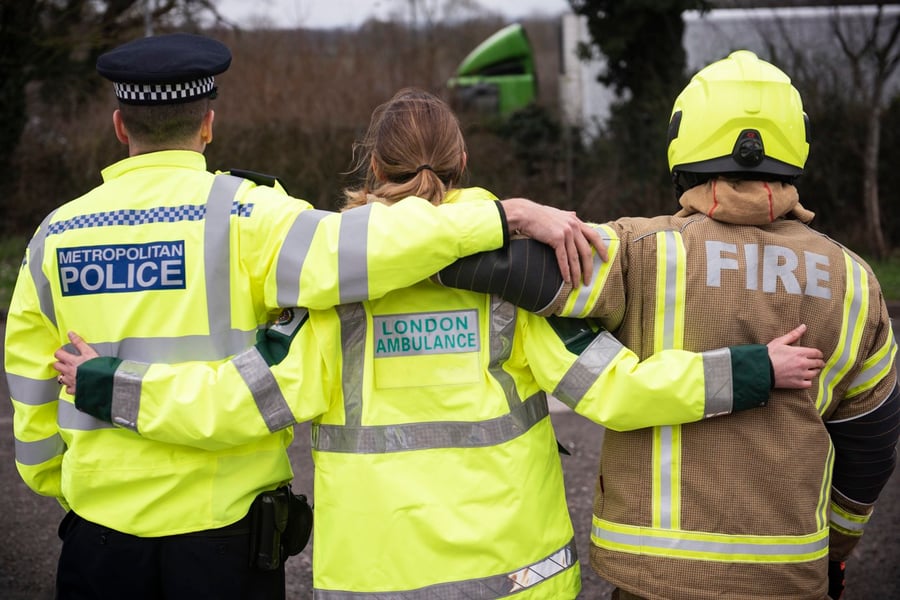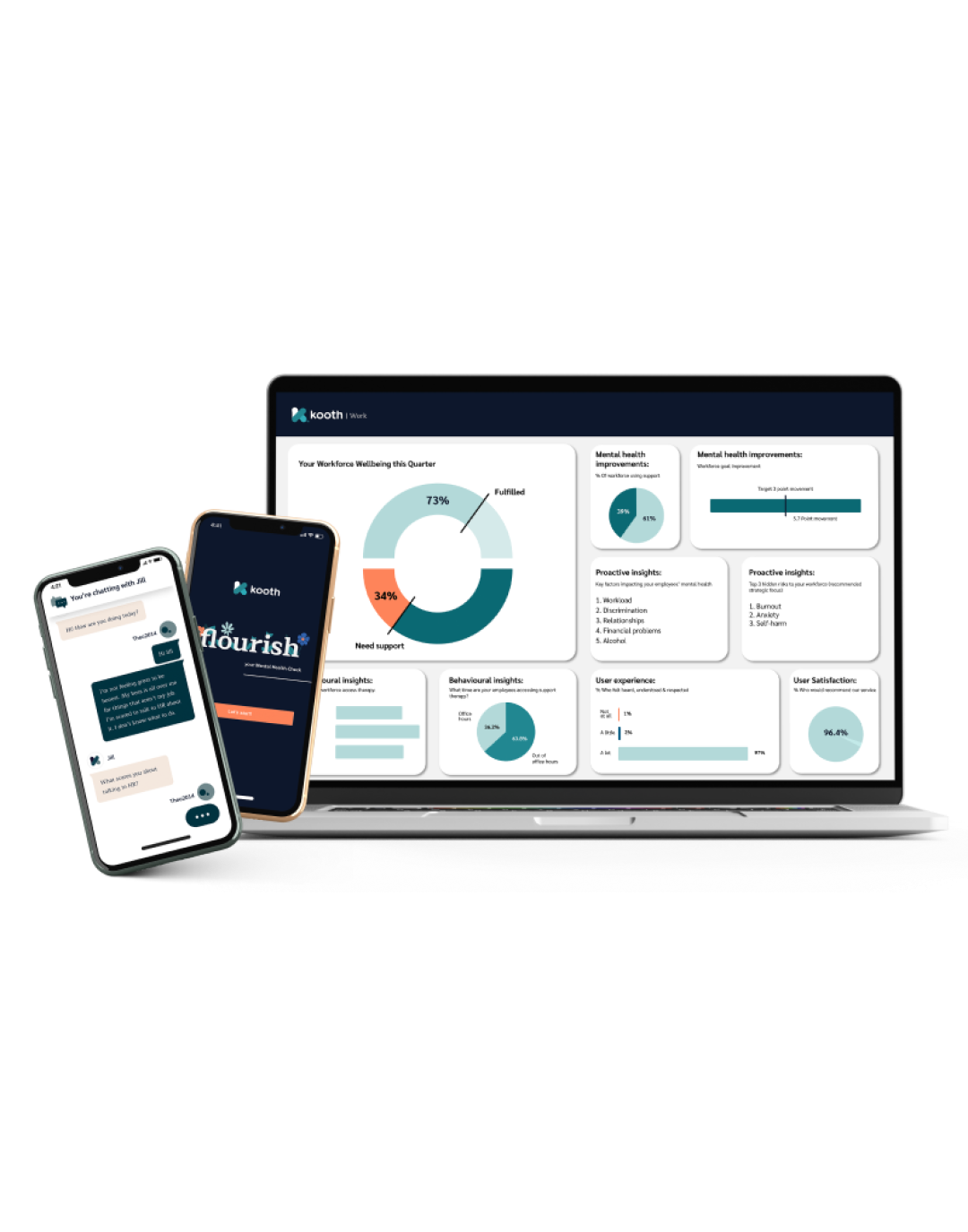People who work in the emergency services – fire, ambulance, and police crew – carry out their jobs under highly-pressured conditions. Unlike most of us, they often deal with life-and-death situations every day.
This article identifies the key challenges facing the emergency services sector and appropriate mental health strategies to support employees in this line of work.
We also recommend visiting our key worker and frontline staff burnout webinar recording and bonus materials for an example of what a mental wellbeing ecosystem of support looks like in an ambulance service.
Unsurprisingly, working under this kind of extreme daily stress can have a serious impact on people’s mental health.
Trauma added to trauma
“My clients who work in the emergency services often experience trauma upon trauma,” says Dr Hannah Wilson, Head of Clinical Governance and Clinical Psychology Lead at Kooth, an organisation that provides mental health support.
“It’s a natural response to feel upset if you witness a road traffic accident or a fire, or see someone die. But this is all part of the job for emergency service workers. And if they’re not experiencing it themselves, they’re often supporting colleagues who have witnessed traumatic incidents.”
The bucket overflows
Dr Wilson explains: “It’s as though each person has a bucket that gradually fills up as they experience traumatic events. If there’s no time to resolve or process those events, the bucket keeps filling up until it overflows. By that stage, the person can be in an acute situation and in urgent need of help.”
The pandemic piles on the pressure
Add a pandemic to the mix, and the pressure is ramped up still further. “People in the emergency services have told me they have a feeling of there being ‘no end in sight’ and of ‘just having to keep going’,” says Hannah. “This leads to a risk of them becoming overwhelmed and suffering from burnout.”
According to Mind’s “Behind the Mask” research, which investigated the impact of the coronavirus pandemic on the mental health of emergency responders:
- 69% of people across the fire, police, and ambulance service said their mental health had gotten worse since the start of the pandemic, with a quarter describing their current mental state as “poor” or “very poor”.
- Almost a third (32%) of ambulance staff described their mental health as “poor” or “very poor”, compared to a quarter (25%) overall.
- Emergency responders expressed widespread concern about the longer-term impact of the pandemic on mental health, particularly in relation to burnout and PTSD.
A culture of not asking for help
These figures are even more concerning given people’s reluctance to ask for support. “Blue light workers won’t necessarily reach out for help,” says Hannah, “or at least not until things have gotten pretty bad.
“They tend to use a lot of banter and dark humour so they can name what they’ve witnessed without seeming to take it too seriously. This can be really helpful and effective, but there are still times when they might need additional support.
“Many adopt a ‘suck it up’ approach and feel ashamed to admit to any kind of emotional struggles or wobbles. They have to find a balance between caring for the people they’re supporting but not empathising too much, because that can result in you becoming traumatised and burnt out.”
Emergency workers may also be caught out in another way. They might feel they have to keep it together for the sake of the team and may not want to worry their friends and family by talking about traumatic experiences. The result is a tendency to bottle up their feelings until those feelings become too much to handle.
Challenges for managers of frontline staff
The current crisis in mental health and wellbeing among emergency workers poses additional challenges for managers who need to provide support for their people, find cover for absences, keep operations going, and meet demanding targets.
“Supporting mental health in the emergency services is a really complex task,” says Donna Lomax, Public Sector Mental Health and Wellbeing Specialist at Kooth.
“It can be difficult to know what’s going to work best for your organisation. Does the Employee Assistance Programme (EAP) give a quick enough response? Will that shiny new app give people the help they need? What kind of help do your employees want? And how can you make it easy for them to find that help?
“In many cases, the pandemic was a catalyst that encouraged organizations to make mental health more of a strategic priority. But there’s still a long way to go.”
Donna’s opinion is backed up by the “Behind the Mask” survey, which found that only 35% of respondents said that their organisation had prioritised their mental health and wellbeing during the pandemic.
What is the right type of mental health support for emergency workers?
What kind of mental health and wellbeing support do people who work in the fire, ambulance, or police services need? A few clear guidelines emerge.
- Flexible times – day and night, 24/7, to fit in with busy working lives.
- Instant – no waiting for referrals or joining waiting lists.
- Stigma-free – talking about mental health and wellbeing must be normalised.
- Confidential – completely anonymous or confidential support.
- Choice of services – access to chat rooms, peer-to-peer support and counselling support via confidential chat.
What part does anonymous digital mental health play?
Anonymous digital mental health support fits the bill by being able to reach employees on the frontline and getting deep into worker populations who are reluctant to talk face to face.
As an example, emergency service employers can offer their frontline staff a range of services to support their people, with options including:
- Self-therapy
- Talking to peers anonymously online, in a safe environment
- Receiving 1-2-1 counselling from therapists at a time to suit their needs
Anonymous and confidential mental health support is proving to be particularly effective at delivering support to the hard-to-reach majority who may be experiencing mental health concerns. It also fits as part of a complete Mental Wellbeing Ecosystem, working alongside your mental health first aid options, EAP, and other tools.
Understanding the underlying mental health factors in your workforce
For employers, as well as providing support to fulfil your duty of care towards employees, it is essential to monitor engagement and keep abreast of the underlying risks within your workforce.
This presents a challenge. How do you track risks and engagement while allowing employees to remain anonymous? It is essential that your data is completely anonymised, enabling you to track trends across your staff population and maintain the ethical and anonymous credentials of your support which makes it so effective.
Spotting potential mental health risks
By conducting a complete mental health check of your workforce, you can see the potential mental health problems across your workforce as well as factors that are influencing your employees’ mental health at a given point in time. This will help you establish a baseline, understand what needs to be addressed, and set improvement strategies.
“For example, Kooth Work’s ‘Flourish’ workforce mental health check provides a clear benchmark of a workforce’s mental health status,” says Donna, “while ongoing anonymous reporting from its Qwell support product helps you understand the risks under the surface. Kooth Work then offers you guidance on how to develop targeted strategies to address these threats at a workforce level.”
What other businesses can learn
Donna adds, “The emergency services have faced serious challenges in supporting their employees’ mental health and wellbeing during the pandemic.
“The organisations that use Kooth Work have helped to maintain operations in high-pressure environments by supporting their employees’ mental health while taking proactive steps to prevent potential future problems. Where these organisations are leading the way today, others will follow tomorrow.”
Want to improve the mental health of your frontline workforce?
Get started here by discovering more about Kooth Work.
Understand. Support. Improve.





